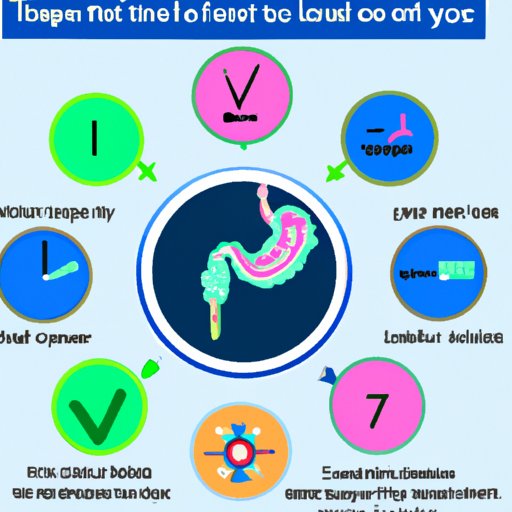Introduction
Stomach viruses, also known as gastroenteritis, are caused by various strains of bacteria, parasites, and viruses. They can cause uncomfortable symptoms that range from mild to severe, such as nausea, vomiting, diarrhea, and dehydration. While they can be unpleasant, they’re usually not serious and can be treated at home. However, it’s important to understand how long you’re contagious with a stomach virus so that you can take the necessary steps to prevent its spread.

Identifying Stomach Viruses and How Long You Can Spread Them
There are several different types of stomach viruses, including norovirus, rotavirus, adenovirus, and astrovirus. Noroviruses are the most common type of stomach virus and are highly contagious. Rotavirus is the most common cause of diarrhea in children and is spread through contact with an infected person or contaminated food or water. Adenoviruses can cause cold-like symptoms, such as fever, sore throat, and coughing, as well as gastrointestinal issues. Astroviruses are less common than the other types of stomach viruses and are typically seen in infants and young children.
The duration of contagiousness for stomach viruses varies depending on the type of virus. Noroviruses can remain contagious for up to two weeks after symptoms have cleared up. Rotavirus can be contagious for up to 10 days after symptoms have resolved. Adenoviruses can remain contagious for up to three weeks. Astroviruses can remain contagious for up to two weeks.
Understanding the Duration of Contagiousness of Stomach Viruses
The duration of contagiousness of a stomach virus depends on the type of virus and the severity of the illness. Symptoms can vary from mild to severe and can include nausea, vomiting, diarrhea, abdominal cramps, and dehydration. In some cases, a fever may be present. The more severe the symptoms, the longer the virus can remain contagious.
It’s important to note that even if you don’t have any symptoms, you may still be contagious. This is because the virus can be shed in the stool or vomit of an infected person even before they start showing symptoms. So, it’s possible to spread the virus before you even know you’re infected.
What Factors Affect How Long You’re Contagious with a Stomach Virus?
The length of time that you’re contagious with a stomach virus is affected by two main factors: the incubation period and the risk of spreading the virus. The incubation period is the amount of time between when you’re exposed to the virus and when you start showing symptoms. The risk of spreading the virus is determined by how easily the virus is transmitted from one person to another.

Examining the Incubation Period for Stomach Viruses and Contagiousness
The incubation period for a stomach virus can last anywhere from 12 to 48 hours, depending on the type of virus. For example, the incubation period for norovirus is typically 12 to 48 hours, while the incubation period for rotavirus can be up to 8 days. During this time, you can still transmit the virus to others, even if you’re not showing any symptoms yet.
Once you start showing symptoms, the virus is considered to be in its infectious phase. This means that you’re more likely to spread the virus to others through contact or by shedding the virus in your stool or vomit. The length of time that you’re contagious during the infectious phase depends on the type of virus and the severity of the illness.

Investigating the Risks of Spreading a Stomach Virus and Prevention Strategies
The risk of spreading a stomach virus is highest when you’re in the infectious phase. It’s important to practice good hygiene, such as washing your hands frequently and avoiding contact with others who may be infected. It’s also important to avoid sharing food, drinks, or utensils with others. If you’re feeling ill, it’s best to stay home and rest until you’re feeling better.
If you’re caring for someone who is infected with a stomach virus, it’s important to wear gloves when cleaning up vomit or diarrhea and to thoroughly wash your hands afterwards. Dispose of any contaminated materials, such as bedding and clothing, immediately. Be sure to clean and disinfect any surfaces that may have been contaminated with the virus.
Conclusion
Stomach viruses can be unpleasant and uncomfortable, but they’re usually not serious. It’s important to understand how long you’re contagious with a stomach virus so that you can take the necessary steps to prevent its spread. The duration of contagiousness depends on the type of virus and the severity of the illness. Good hygiene practices, such as frequent handwashing and avoiding contact with others who may be infected, can help reduce the risk of spreading a stomach virus.
(Note: Is this article not meeting your expectations? Do you have knowledge or insights to share? Unlock new opportunities and expand your reach by joining our authors team. Click Registration to join us and share your expertise with our readers.)
